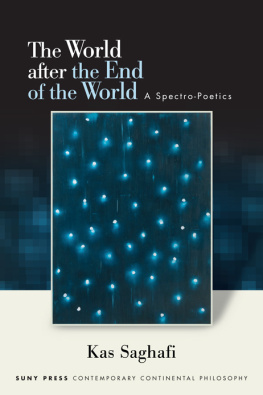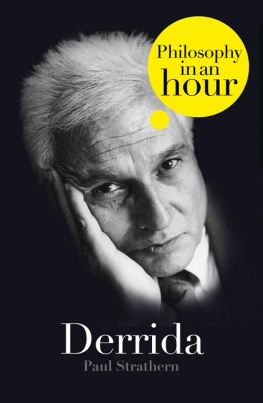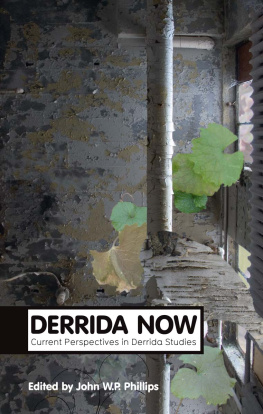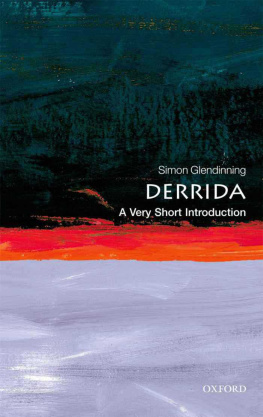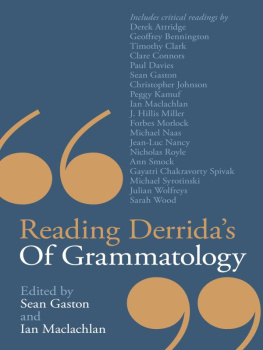DERRIDA AND THE WRITING OF THE BODY
For Melissa
Derrida and the Writing of the Body
JONES IRWIN
St. Patrick's College, Dublin City University, Ireland
ASHGATE
(c) Jones Irwin 2010
All rights reserved. No part of this publication may be reproduced, stored in a retrieval system or transmitted in any form or by any means, electronic, mechanical, photocopying, recording or otherwise without the prior permission of the publisher.
Jones Irwin has asserted his right under the Copyright, Designs and Patents Act, 1988, to be identified as the author of this work.
Published by
Ashgate Publishing Limited
Wey Court East
Union Road
Farnham
surrey, GU9 7PT
England
Ashgate Publishing Company
suite 420
101 Cherry street
Burlington
VT 05401-4405
USA
www.ashgate.com
British Library Cataloguing in Publication Data
Irwin, Jones.
Derrida and the writing of the body. 1. Derrida, Jacques. 2. Deconstruction. 3. Literature-Philosophy.
I. Title
194-dc22
Library of Congress Cataloging-in-Publication Data
Irwin, Jones.
Derrida and the writing of the body / by Jones Irwin.
p. cm.
Includes bibliographical references and index.
ISBN 978-0-7546-7865-6 (hardback) -- ISBN 978-0-7546-9702-2 (ebook) 1. Derrida, Jacques. 2. Derrida, Jacques. Icriture et la diffirence. I. Title.
B2430.D484I57 2010
194--dc22
2010005636
ISBN 9780754678656 (hbk)
ISBN 9780754697022 (ebk-ePUB)

Printed and bound in Great Britain by T J International Ltd, Padstow, Cornwall
Contents
Acknowledgements
A Staff Research Fellowship in the academic year 2008-2009 from St. Patrick's College, Drumcondra, made the writing of this book possible. At St. Pat's, I am lucky to have a supportive and inspiring set of colleagues and friends and I would especially like to thank Andrew O'Shea, Joe Dunne, Maeve O'Brien, Eileen Brennan, Ann Louise Gilligan, Philomena Donnelly, Paula Murphy, Therese Dooley, Ben-Staunton Collins, Deirdre Pearson, Margaruete Kirwan, Mark Morgan and Mary shine-Thompson. At the previous Philosophy departments where I have taught and studied, I would like to thank the late Fr. Fergal O'Connor, Richard Kearney, Tim Mooney, Mark Dooley and Brendan Purcell at UCD, Martin Warner, Angie Hobbs, Miguel de Beistegui, stephen Houlgate, Keith Ansell-Pearson, Peter Poellner and Lynda Hemsley at Warwick and Stephen Thornton, John Hayes, David Blake, John Eustace and Roland Tormey at MIC, Limerick. A Visiting Fellowship to the Centre for Philosophy, Literature and the Arts, at the University of Warwick, has been a spur to engage with the most recent Continentalist work, Helena Motoh in Ljubljana and Laima Pa c ekajut e in Vilnius University made my trips there productive and enjoyable and Rob Fisher generously helped me to get started on the publishing and conference front with ID.Net.
I would also like to thank Ashgate for their support and especially my editor Neil Jordan for patience and insight and sarah Wardill for editorial help. Deena Des Rioux has been very generous to me in relation to the employment of her work and I look forward to working together on future projects. I would also like to thank Malahide library staff for their help during my work there and Asta Vilkaite for keeping me sane with the chai lattes. Finally, I would like to pay respects to the late Jacques Derrida himself. I first encountered his work as an undergraduate and, although my passion for his work has ebbed and flowed through the years, I am constantly brought back to his immense brilliance as a philosopher and writer.
I have acknowledgments to make to Rodopi publishers in terms of permission to publish from three previous essays of mine. Parts of from my 'Diogenes, st. Paul, Habermas and Beyond - Derrida on Cosmopolitanism', in Interculturalism: Between Culture and Politics, edited by Jones Irwin and Nancy Billias (Rodopi, 2010).
Throughout the writing of this book, my family have been a source of joy and sustenance. Eloise, Jeremy and Gregory have been fantastic kids and will be delighted to know that Daddy's book is finally finished! I would also like to thank my parents, Leslie and Una, and sister Judy, and Patrick, Mary and Zoe in Spain, for all their support and kindness. I dedicate this book to Melissa, for being such a wonderful person to share my life with.
Jones Irwin
Dublin
November 2009
Introduction
Opening
'In every reading', Derrida tells us, 'there is a corps-a-corps between reader and text' (Derrida 1986c: 126). Corps-a-corps, body to body, is not a notion which one readily associates with the work of Jacques Derrida. As he is the first to admit, it is rather as an 'arid intellectualism' (Derrida 1986c: 126) that deconstruction is often pictured, at least by its opponents. Before his eventual rapprochement with Derrida, this is the vision which Jurgen Habermas influentially portrays of deconstruction (Habermas 1990): as idealist, self-indulgent and apolitical. While this view of Derrida undoubtedly represents an extreme perspective within the discourse surrounding his work, it is undeniable that even more moderate viewpoints often contain a residual element from this picture. That is, we can say, deconstruction is widely perceived as having little or nothing to say about embodiment, existence, desire, politics or sexuality.
Against these manifest appearances, I will argue for an understanding of Derrida's work which connects it powerfully to the very themes which many commentators wish to deny to it, precisely such themes as embodiment, existence, desire, politics or sexuality. As always with Derrida, the consideration of these themes is nuanced and patient in his work, but close reading of his texts demonstrates the significance of this trajectory from his early work onwards. Here, my guiding notion will be a Derridean 'writing of the body' ('l'ecriture du corps', Derrida 1967h: 287) as an exploratory theme for looking at deconstruction. I will trace this conception of a 'writing of the body' successively through Derrida's readings of the work of the avant-garde,a 'l'ecriture du corps' first emerges) and Georges Bataille, through to his staging of an extraordinary encounter between stephane Mallarme and Plato, through to his readings of Nietzsche, feminism and political philosophy. In each instance, I will be seeking to draw out a rather different understanding of deconstruction from the one we are used to, a Derrida who has much to tell us about life, embodiment, desire and sexuality. To re-deploy a phrase of Herman Rapaport (Rapaport 2002), we might say that Derrida is 'an existentialist of a different feather'.
Re-reading Derrida
It is clear from even Derrida's earliest texts on phenomenology that the intellectual influences on his work differ from what one might have expected. James Joyce, for example, appears rather unpredictably in Derrida's Introduction a l'Origine de la Geometrie par Edmund Husserl [hereafter Introduction to Husserl 's Origin of Geometry], published in 1962 (Derrida 1962/1989), but even in 1959 in his first published essay 'Genese et Structure et la Phenomenologie' [hereafter 'Genesis and Structure and Phenomenology'] (Derrida 1967g/1978e), the introduction of the concepts of 'non-meaning' and 'death' strike a rather discordant note, and suggest a rather idiosyncratic framework. By 1963 and the publication of 'Force et Signification' [hereafter 'Force and Signification'] (Derrida 1967d/1978b), this subtext is becoming more explicit. Derrida's topic is 'literature', most especially interpretations of Stephane Mallarme's poetry (Mallarme 2008), but he is now already invoking Maurice Blanchot (Blanchot 1997).
Next page

